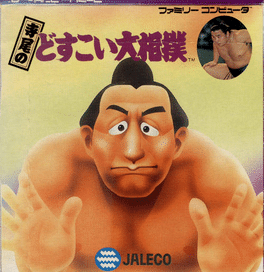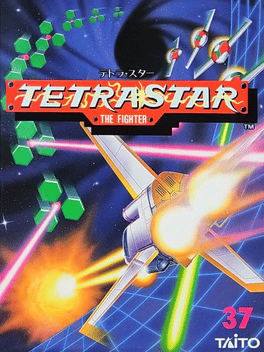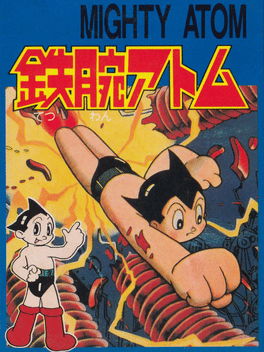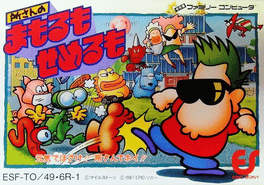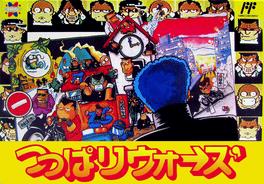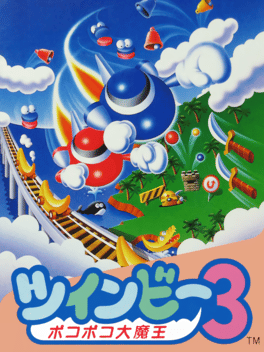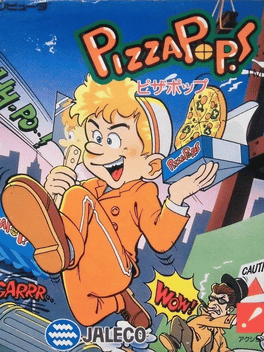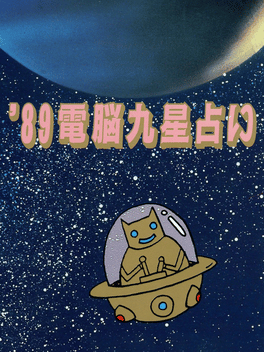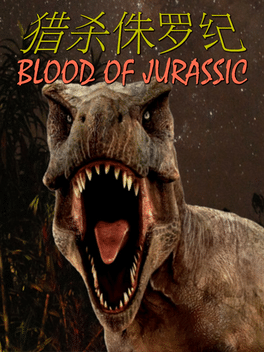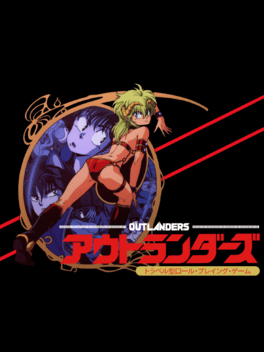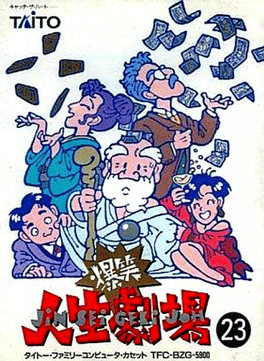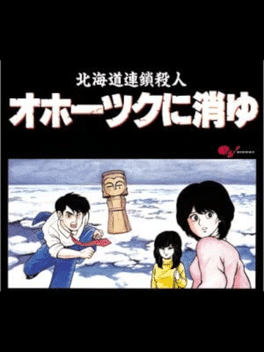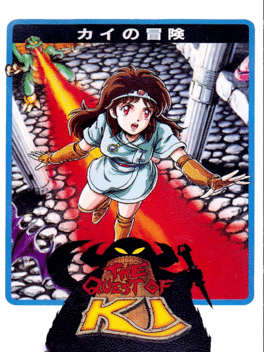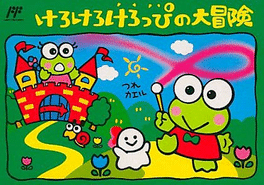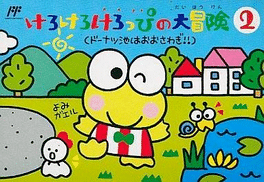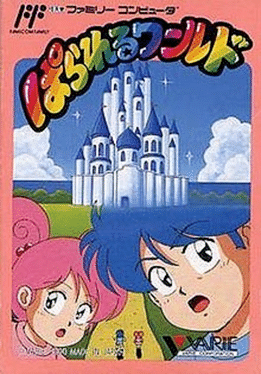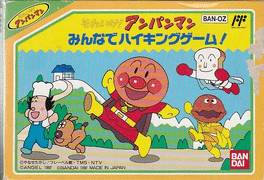Most Popular Family Computer Games - Page 46
-
Terao no Dosukoi Oozumou
1989
Terao no Dosukoi Oozumou is a Sports game, developed by TOSE and published by Jaleco Entertainment, which was released in Japan in 1989. -
Tetrastar: The Fighter
1991
Tetrastar The Fighter is a 3D shooter by Home Data and published by Taito. In the year 2089, humanity forms an alliance with the intergalactic Baal empire but soon Earth finds out about the alien's true intentions. A group of resistance assembles the project Tetrastar to prepare for the potential upcoming threat. But the project lead by the general Nelson is soon put on hold and a short lived peace settles in. But the whole thing was nothing more than a hostile invasion and the Baal empire finally breaks the alliance and attacks Earth. The player's first mission is to prevent New York to be destroyed and then to retrieve Omega, the faithful robot navigator, to warp to the alien's mother world. The Tetrastar super fighter can move around the screen and fire a standard Vulcan gun. Special weapons become available later in the game from Bombs (WID), Homing Missiles (AAM), Napalm Bombs (NAP) and the powerful Bio Cannon (BIO) - they are accessible via the Select button and triggered by pressing A. They all come in limit -
Mighty Atom
1988
Mighty Atom
1988
Tetsuwan Atom is an action game developed by Home Data and published by Konami for the Famicom in Japan early on in 1988. The game stars Tetsuwan Atom, a popular early anime character who is better known as Astro Boy outside of Japan. Tetsuwan Atom was originally created in 1951 by Osamu Tezuka. The successful series started as a comic strip and was turned into a black and white animated series in 1963. It was one of the first (if not the first) animated TV series produced in Japan, and has influenced countless Japanese animated series that followed. The little robot-boy is one of Japan's most recognizable character. The story takes place in the future, at a time where humans and robots live together in harmony. The powerful robot-boy Atom lives with Professor Ochanomizu, an old scientist who takes good care of the little robot, and helps him fight crime and injustice. One day, burglars break into Professor Ochanomizu's lab and steal all of his money. It is now Atom's duty to recover the stolen loot. -
Tokoro-san no Mamoru mo Semeru mo
1987
An action platformer game by Sony label Sony Epic Records that was only released in Japan on June 27th, 1987. It is named for and features the real-life Japanese celebrity Tokoro Jouji. Tokoro-san no Mamorumo Semerumo is an action platformer that stars real-life Japanese musician/comedian/voice-actor Tokoro Jouji, a.k.a. George Tokoro. Armed with a water pistol with a finite supply of water, Toroko-san must make his way across various levels either shooting or avoiding the various enemies along the way. This game has some notoriously poor game design, such as ammo replenishing items being hidden, which means the player needs to shoot randomly to find them which simply depletes their finite ammo supply even faster. If the player takes too long in any one world, a massive vision-obscuring storm will roll in and make the game considerably more difficult to play. The game, however, does feature an early example of a non-linear stage selection progress as different paths become available after defeating each boss. -
Tsuppari Wars
1991
Tsuppari Wars
1991
Tsuppari Wars is an action video game for the Family Computer. The object is to acquire all of the enemies' territory and defeat the evil gang leaders. The gangsters fight without any weapons and the violence level is mild compared to later gang-related games. Its spiritual descendant is Grand Theft Auto: San Andreas due to its simulation of gang warfare. -
TwinBee 3: Poko-poko Daimaou
1989
TwinBee 3: Poko Poko Daimaō is a vertical-scrolling shoot 'em up video game produced by Konami released for the Famicom. It is the third and last game in the TwinBee series for the Famicom and it ditches Stinger's horizontal levels making it more in line with the first title. The game is considerably easier than its predecessors due to an option mode that allows players to adjust the difficulty and number of ships, as well as the inclusion of the new "soul reviving system", which allows players to recover their power-ups after losing a ship. The game uses digitized PCM voice samples, particularly when the conga music in one stage chants "Poko Poko", and in the beginning of each stage, in which a voice proclaims the name of the stage. It was re-released on April 14, 2006 as part of the i-Revo downloadable game service. -
SD Keiji: Blader
1991
SD Keiji: Blader
1991
SD Keiji: Blader is a Role-Playing game, developed by NMK and published by Taito Corporation, which was released in Japan in 1991. -
Pizza Pop!
1992
Pizza Pop!
1992
The Pizza Boy must deliver pizzas to various dangerous locations in order to make enough money to buy his girlfriend an engagement ring. He is thwarted by many enemies, including his romantic rival who appears frequently to take him down. Points are scored at the end of each stage based on completing stages quickly, defeating enemies and recovering extra pizzas. -
'89 Dennou Kyuusei Uranai
1988
'89 Dennou Kyuusei Uranai is one of those horoscope sims that used to be very popular in Japan in the early days of home consoles. They still exist today, but they tend to be extended to more interactive dating sims rather than just walls of text to read. This game being released in December 1988 and namely so, it was designed to predict your fortune for the upcoming year 1989. This makes attempting to play it already kind of useless once the year had passed. Therefore one can only look back at what the computer predicted for you back in 1989. -
Blood of Jurassic
1997
Blood of Jurassic
1997
An unlicensed shooter from Inventor for the Famicom, allowing players to choose from 6 different stages of dinosaur action. Compatible with the NES zapper. -
Dream Fighter
1992
Dream Fighter
1992
Unlicensed fighting game by Caltron for the Famicom. Tony must fight his way around the world to prove he is the greatest world warrior, the Dream Fighter! -
Outlanders
1987
Outlanders
1987
In the midst of a violent invasion of Earth by unknown alien forces, photojournalist Wakatsuki Tetsuya comes across a scantily-clad alien woman, cutting a swath of death through the Terran ranks with her sword. After a chaotic struggle, Tetsuya is knocked unconscious, only to awaken aboard her starship. To his surprise, she turns out to be Kahm, the invaders' princess - and she has picked Tetsuya for a starring role in her upcoming wedding. As the groom.... -
Bakushou!! Jinsei Gekijoh
1989
The first game in the Bakushou!! Jinsei Gekijoh series and is a four-player NES board game simulation that plays like Milton Bradley's The Game of Life. It was only released in Japan on March 17th 1989. Bakushou!! Jinsei Gekijoh ("Burst of Laughter!! Theater of Life") is the first game in a long-running series developed and published by Taito for the Nintendo Entertainment System in Japan that allows players to live an entire lifetime, moving through various stages of life and accruing as much wealth as possible. It is based on the Jinsei Game, or The Game of Life as it is known in the west. Up to four human players take turns moving around a board by a number of squares as indicated by dice rolls and make various life decisions, or are passively shown events happening to them, which determine their success. The game was followed by two sequels for the NES and four for the SNES. -
Hokkaido Rensa Satsujin: Okhotsk ni Kiyu
1987
A man's corpse is discovered near a sea wharf in Tokyo Bay. While the police investigates, a 2nd and 3rd murder occurs one after another. You begin your investigating with Shunsuke Saruwatari, a detective from the Kushiro station, and seek the truth to discover the criminal's motivation. An examination of the relation between the victims exposes a important details from the past. -
The Quest of Ki
1988
The Quest of Ki
1988
The Quest of Ki is a 1988 video game developed by Game Studio and published by Namco for the Family Computer. It is the third game in Babylonian Castle Saga series which started with the 1984 arcade game, The Tower of Druaga. The story of The Quest of Ki is actually a prequel to the original Tower of Druaga. It occurs shortly after the demon Druaga has stolen the Blue Crystal Rod and taken it to his tower. The goddess Ishtar sends the priestess Ki to the tower in order to retrieve it. The game then follows her doomed quest to the top of the tower, and leads directly into the story of the original game. The game is a side-scrolling platformer with one hundred levels. In each level, the player's goal is to pick up a key and open the door leading to the next area. Various enemies, including slimes, ghosts, and wizards, appear on each floor, and any contact with them results in death. Ki has no weapons, and thus can not damage or defeat any of the enemies. Her only abilities are to dash and jump. As long as the play -
Kero Kero Keroppi no Daibouken
1991
Kero Kero Keroppi no Daibouken is based on the popular Sanrio character Keroppi. Released on the Nintendo Family Computer console in Japan in 1991. Big Adventure is a children's puzzle game where Keroppi must rescue his girlfriend Keroleen who is locked up in a castle. To do so, he must solve the action based puzzles in seven differently themed worlds with four different types of stages (the surface of the maze, flying a plane, a Reversi-like level, and through a field of lava). All the items in the game are pre-determined; there is a need to memorize the pattern for each playthrough so that a player may advance through the levels more quickly once they have achieved a degree of expertise in the game. -
Kero Kero Keroppi no Daibouken 2: Donuts Ike ha Oosawagi
1993
Kero Kero Keroppi no Daibouken 2: Donuts Ike ha Oosawagi is a Japan-exclusive action video game video game for children that was released on the Family Computer console in 1993. This video game has Sanrio's character searching for lost children who have been kidnapped by monsters. Essentially a standard Super Mario Bros. clone, the player controlling the cartoon frog has to leap around platforms jumping on baddies or killing them with his croak weapon. Each bonus level involves matching characters from the Sanrio franchise in a format similar to the card game Concentration. Intermission screens show the progress of the character throughout the game. Levels range from the forest to a seaside setting. -
Perman Part 2: Himitsu Kessha Madoodan wo Taose!
1992
"Paaman (or quite possibly Parman) is a comic in Japan which is done by the same guy who did Doraemon. Like that wasn’t already obvious just by looking at ‘em. All of the four characters that you have the choice of controlling have the amazing ability to fly in an amazingly awkward fashion. I don’t think there’s any difference in who you want to pick though. What’s awkward about flying is, if you’re flying Up and want to go Left, you don’t just automatically go Left when you hit the control pad… you go diagonally, then you go left. And you don’t sit still if you let go of the control pad, you have to hit A to stop. And then you have to hit A again to fall to the ground and walk around like normal. Which is all very weird. But you can jump REALLY high, so that’s cool. There’s a side view, where you can fly, like what I was just talking about, and there’s a top view, where you walk around inside of buildings and stuff. You can’t fly though, but you can jump, which is pretty useless. What’ -
Parallel World
1990
Parallel World
1990
Parallel World is a puzzle video game developed by EIM and published by Varie. It was released in Japan for the Family Computer on August 10, 1990. The player and his girlfriend must find their way back home after being sucked into an alternate universe. A magnificent castle full of 25 different game worlds block their progress, however, and they are filled with enemies on every stage. The player has an overhead view to destroy the enemies for extra loot. Given a strict time limit of 100 seconds to solve each puzzle, the game rewards fast puzzle solvers. The first player controls the male while the second player controls the female. Players only start with three lives and lose them when time runs out or when a monster comes into contact with him/her. Enemies in the game include springs, rollers, witches, and zombies. -
Soreike! Anpanman: Minna de Hiking Game!
1992
Anpanman travels around the world helping people. But what is Anpanman? He’s a superhero whose head is made out of sweet rolls filled with bean jam. Soreike! Anapanman is a fun board game for the Famicom, based on a cartoon by the same name. It is relatively straightforward and simple to play, with no complex features or obstacles to overcome. There are eight maps and a ninth to unlock, and up to three human players can participate. Join Currypanman and Shokupanman as you try to beat Baikinman!
